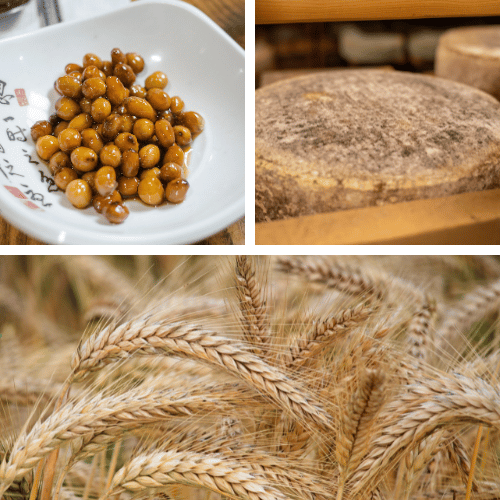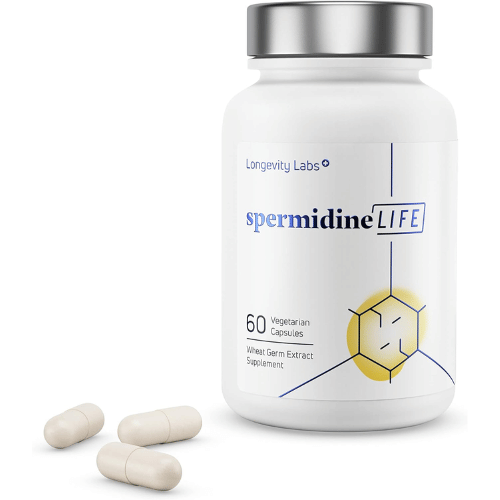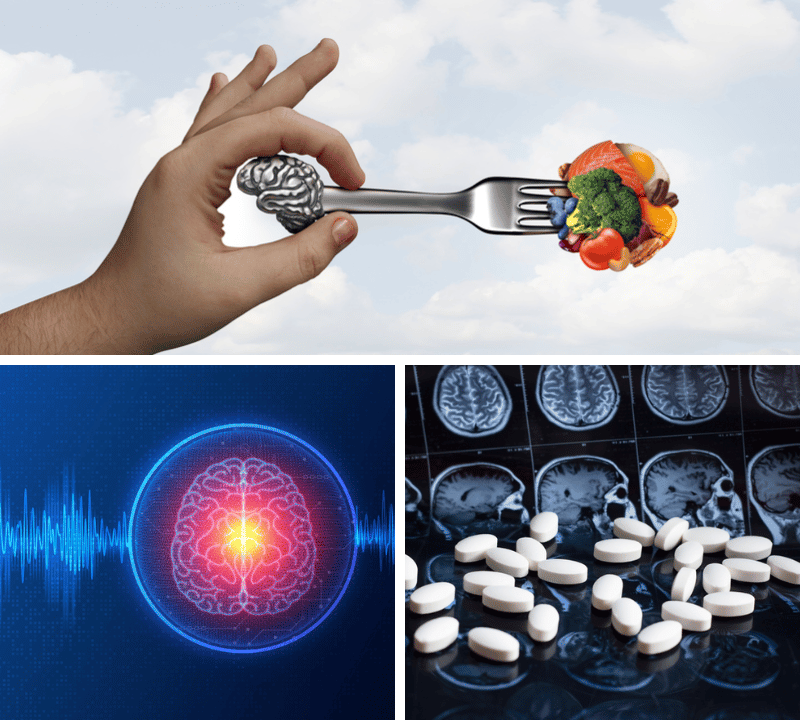The answers often lie in what we eat in our pursuit of health. Spermidine, a biogenic amine found in the very fabric of our living tissues, stands out as a beacon of hope in this quest. This polyamine, crucial in cellular processes, has been linked to various health benefits — from bolstering cell growth and memory retention to potentially warding off liver cancer. But the burning question remains: what is the richest source of spermidine, and how do we seamlessly weave it into our diets? This guide is not just an exploration of spermidine-rich foods like fermented soybean products, aged cheeses, and wheat germ; it's a journey into the heart of what it means to nourish our bodies. We'll dive into the fascinating world of free amino acids, biologically active polyamines, and the impact of dietary intake on human health. From the humble green peas to the robust flavors of blue cheese and the versatility of soy sauce, each food item is key to unlocking spermidine's potential. With insights into spermidine supplements, the role of diet in cell growth, and how environmental influences affect our dietary choices, this article is your comprehensive resource for enriching your regular diet with spermidine. Whether you're assessing your dietary intake or curious about fermentation and its products, you'll find valuable information to make spermidine intake easily a part of your life. Join us as we unravel the secrets of spermidine, showcasing how simple yet impactful changes in our diet can contribute to our well-being and protect against diseases, one plate at a time.
Key Takeaways:
- Spermidine is a polyamine that is crucial in cellular processes and human health.
- The richest sources of spermidine are found in various foods, including fermented soybean foods, aged cheeses, and wheat germ.
- Regularly incorporating spermidine-rich foods into your diet can contribute to overall well-being and may offer protection against certain diseases.
Spermidine: A Vital Polyamine for Cell Health and Longevity
Spermidine, more than a biochemical compound, is a cornerstone of cellular health. This naturally occurring polyamine is crucial for maintaining cellular homeostasis, a balance vital for our well-being. Its role extends far beyond basic cell functions; spermidine is deeply involved in DNA stabilization and gene transcription and ensures the smooth operation of ion channels.
But the marvels of spermidine don't stop there. Its significance in promoting autophagy, the body's mechanism for cleaning out damaged cells, is a breakthrough in understanding how we can enhance cellular function and longevity. This process is akin to an internal cleansing ritual, ensuring our cells remain healthy and efficient.
The impact of spermidine on cell growth is profound. It's a key player in polyamine biosynthesis, an essential tissue growth and maintenance process. The breadth of spermidine's influence is vast, from promoting robust hair growth and aiding in plant vitality to its potential role in safeguarding our memories. Research suggests that regular spermidine intake could be a game-changer in reducing memory loss risks, offering a beacon of hope in cognitive health preservation.
Incorporating spermidine-rich foods into our diet, like fermented soybean products, aged cheeses, and wheat germ, can be a simple yet effective way to tap into these benefits. As we uncover how spermidine contributes to our health, from cellular processes to combating environmental influences, its significance in a balanced, healthful diet becomes ever more apparent.
Embracing a diet rich in spermidine doesn't just nourish our bodies; it's a step towards enhancing our overall quality of life, one cell at a time.

Spermidine-Rich Foods: A Treasure Trove of Health Benefits
Fermented Soybean Products: A Spermidine Powerhouse
Fermented soybean products are not just culinary delights in Asian cuisines but also a primary spermidine source. The fermentation process does more than enhance flavors; it significantly increases the bioavailability of spermidine and other vital free amino acids. Natto, a traditional Japanese food made from fermented soybeans, stands out with its high spermidine content. Similarly, soy sauce and tempeh are flavor enhancers and deliver substantial amounts of spermidine. This makes them ideal for anyone looking to increase their spermidine intake through diet naturally.
Aged Cheese: A Flavorful Spermidine Source
Aged cheeses are a delectable way to add spermidine to your diet. Varieties such as blue cheese, goat cheese, and matured cheese undergo a ripening process that develops their unique flavors and increases their spermidine content. The aging process allows beneficial bacteria to produce more spermidine, making these cheeses an excellent choice for those seeking taste and health benefits. Incorporating aged cheese into your diet is a culinary treat and a smart health choice.
Wheat Germ and Rice Bran: Plant-Based Spermidine Champions
For those following a plant-based diet, wheat germ, and rice bran are invaluable sources of spermidine. Wheat germ, the nutrient-rich core of wheat kernels, is packed with spermidine and other nutrients like fiber and vitamin E. It can be easily added to your regular diet, sprinkled over cereals, yogurt, or salads. Rice bran, the outer layer of the rice grain, is another excellent source. These plant-based options are rich in spermidine, provide additional health benefits, and are versatile in various recipes.
Chicken Liver: An Animal-Based Spermidine Source
Chicken liver is an often overlooked yet excellent source of spermidine. It's a versatile ingredient that can be prepared in numerous ways – from being pan-fried to being used in pâtés. Rich in nutrients, chicken liver provides spermidine, essential vitamins, and minerals. For those who include animal products in their diet, chicken liver is a potent choice for boosting spermidine intake, contributing to a balanced and nutrient-dense diet.
Vegetables and Fruits: Natural Spermidine Providers
Vegetables and fruits are natural and readily available sources of spermidine. Including a variety of them in your diet ensures a consistent and diverse intake of this important compound. Green peas, broccoli, and mushrooms are particularly rich in spermidine, offering a simple way to boost your intake. These whole foods provide spermidine and many other nutrients, supporting overall health and wellness. Adding these vegetables and fruits to your diet is an easy and effective way to enhance your spermidine levels naturally.
Spermidine's Geological Edge: The Rock Cress Connection
Have you ever wondered how certain plants thrive in rocky terrains? Enter rock cress, a resilient little plant that's surviving and serving as a spermidine goldmine. This hardy species often found clinging to stony crevices, is a testament to the power of spermidine in supporting life in the most inhospitable environments. It's fascinating to see how these plants leverage the compound to combat stress and promote growth, making them an intriguing subject for those interested in the intersection of geology and biology.
Rock cress doesn't just fascinate geologists and botanists; it's also catching the attention of health enthusiasts. As a natural source of spermidine, rock cress offers a unique addition to the dietary repertoire of anyone looking to boost their intake of this potent polyamine. While not as commonly consumed as other spermidine-rich foods, rock cress can be a novel and nutritious ingredient in salads and as a garnish, providing a peppery kick similar to its relative, the mustard plant. Its inclusion in the diet underscores the diverse ways we can harness the benefits of spermidine from the world around us.
Spermidine in Diet: Maximizing Intake for Optimal Health
Enhancing Your Diet with Spermidine
Increasing your spermidine intake can be a straightforward and enjoyable journey with various food options. By integrating fermented soybean products like natto and tempeh, you're adding rich flavors to your meals and boosting your spermidine levels. Aged cheeses, such as blue and goat cheese, offer a gourmet way to enhance your diet. Additionally, plant-based sources like wheat germ and rice bran allow vegetarians and vegans to increase their spermidine intake. Chicken liver, known for its high spermidine content, can be especially beneficial for non-vegetarians. These diverse food choices make it easy to enrich your diet with spermidine and enjoy its numerous health benefits.
The Benefits of a Spermidine-Rich Diet
A diet rich in spermidine is about enjoying diverse and delicious foods and investing in your cellular health and longevity. Regular consumption of spermidine-rich foods can support cellular processes, enhance autophagy (the body's mechanism of cleaning out damaged cells), and potentially reduce the risk of diseases such as liver fibrosis and hepatocellular carcinoma. Leveraging a polyamine database can guide you in making informed dietary choices, allowing you to maximize your spermidine intake and reap its benefits. This approach can contribute significantly to your overall well-being, protecting against cellular damage and promoting healthier aging.
Incorporation Strategies for a Spermidine-Rich Diet
Incorporating spermidine into your diet can be both easy and enjoyable. Sprinkling wheat germ on your breakfast cereals or yogurt or adding it to your salads is a simple yet effective way to boost your spermidine intake. Enjoying a slice of aged cheese like blue cheese or goat cheese can turn a regular meal into a spermidine-rich experience. For those who love Asian flavors, incorporating fermented soybean dishes like natto and tempeh can significantly enhance spermidine levels. Chicken liver, with its versatility in recipes from stir-fries to pâtés, offers a nutrient-rich source of spermidine for meat-eaters. These strategies increase your spermidine intake and add a delightful variety to your regular diet, making healthy eating a pleasure.
Spermidine in Plants and Environment: The Natural Connection
Spermidine's Role in Plant Growth and Development
Spermidine plays a pivotal role in the plant kingdom and is essential for more than just human health. It's a key player in regulating intracellular pH and membrane potential in plants, both critical for healthy cellular functioning. Spermidine also plays a role in polyamine biosynthesis, vital for plant growth and development. It helps plants respond effectively to environmental stresses like drought, salinity, and temperature extremes, thereby contributing to their resilience and vitality. This compound involves various physiological processes, including cell growth, tissue differentiation, and the plant's response to osmotic stress. Its presence is crucial in supporting plant health, from aiding in seed germination to enhancing the growth of fruits and vegetables. This contributes to the health and development of the plants and directly impacts the nutritional quality of the foods we consume.
Environmental Factors Influencing Spermidine Levels
Various environmental factors significantly influence the levels of spermidine in our food. Soil quality, for instance, plays a critical role. Nutrient-rich soil can enhance the spermidine content in plants, leading to higher levels in the fruits and vegetables grown in such conditions. Osmotic stress conditions, such as drought or excessive salinity, can also impact spermidine levels. Plants often increase polyamine production, including spermidine, as a response to these stressors, which can alter their spermidine content. Additionally, the ripeness of produce during harvest is another key factor. Fully matured fruits and vegetables tend to have higher levels of bioactive amines, including spermidine. Understanding these environmental influences is crucial for selecting foods with optimal spermidine levels. It also highlights the importance of sustainable agricultural practices and proper harvesting techniques in ensuring the nutritional quality of our food supply.

Exploring the Benefits of Spermidine Supplementation
In the quest for optimal health, spermidine plays a vital role, but not everyone can achieve the required levels through diet alone. This is where spermidine supplementation steps in as a practical solution. Quality spermidine supplements offer a convenient way to maintain adequate levels of this crucial polyamine, ensuring that individuals reap its full benefits even when dietary intake is insufficient.
The value of high-quality spermidine supplements cannot be overstated. These supplements are specifically formulated to support the cellular processes that spermidine influences, such as enhancing autophagy, promoting cellular renewal, and potentially extending cellular lifespan. By supplementing your diet with spermidine, you can potentially bridge the gap in your dietary intake, especially if you have dietary restrictions or preferences that make it challenging to consume spermidine-rich foods.
Furthermore, quality supplements are often designed to maximize bioavailability, ensuring that the body can efficiently absorb and utilize spermidine. This is particularly important as the effectiveness of any supplement is directly tied to how well the body absorbs it. Reliable brands invest in research and technology to enhance the absorption and efficacy of their products.
Choosing the right product is important for those interested in exploring spermidine supplementation. Quality, purity, and spermidine concentration in supplements can vary significantly between brands. To assist you in this decision-making process, we have compiled a comprehensive review titled “What is the Best Spermidine Supplement? A Review of the Top Brands.” This article (link below) will guide you through the top spermidine supplements on the market, helping you make an informed choice based on your health needs and preferences. 👇
By considering spermidine supplementation, you're taking a proactive step towards supporting your health and well-being, ensuring that your body receives the optimal levels of this essential compound. However, it's important to remember that supplements should be used judiciously and with professional medical advice. Consulting with a healthcare professional is crucial before starting any supplementation regimen. This ensures the supplement is appropriate for your specific health needs and circumstances. A healthcare provider can offer guidance on the proper dosage and usage based on your unique health profile, dietary habits, and any existing medical conditions. They can also help you understand how spermidine supplements might interact with your current medications. This personalized approach ensures that you maximize the benefits of spermidine supplementation safely and effectively, tailored to your health requirements.
The Multifaceted Benefits of Spermidine in Health and Disease Prevention
In our journey through the world of spermidine, we've uncovered its critical role in cellular processes and its potential impact on human health. Spermidine, involved in the de novo biosynthesis of polyamines, is essential for regulating cellular aging, autophagy, and other vital functions. Its connection to reducing the risk of cardiovascular diseases and potentially enhancing longevity is particularly striking. Spermidine supports nucleic acids and protein synthesis, vital for cell growth and maintaining healthy tissues. Moreover, its potential to slow down the aging process and aid in repairing damaged cells underscores its significance. This polyamine's emerging role in protecting against memory loss and liver health issues further highlights its importance in our diet.
Spermidine and Memory Loss: A Potential Protective Effect
Emerging research suggests spermidine may play a protective role against memory loss. By enhancing autophagy and promoting cellular renewal, spermidine could help preserve cognitive functions, potentially offsetting age-related decline. This presents a promising avenue for maintaining mental acuity and preventing memory issues, especially as we age.
Spermidine and Liver Health: What's the Connection?
Studies indicate spermidine's potential in protecting against liver diseases, including liver fibrosis and hepatocellular carcinoma. For individuals at risk of these conditions, incorporating spermidine-rich foods or supplements could be a strategic part of prevention and management, offering a dietary approach to supporting liver health.
Spermidine and the Prevention of Liver Cancer
The preventive potential of spermidine against liver cancer is gaining attention. Animal model studies reveal that spermidine can be a crucial element in a cancer-preventive diet, highlighting its role in cellular health and its possible efficacy in reducing the risk of liver cancer.
The Impact of Spermidine on Hair Growth
Spermidine has been associated with stimulating hair growth by prolonging the active phase of the hair growth cycle. This could benefit individuals experiencing hair thinning or those aiming to maintain robust, healthy hair, making spermidine a valuable component for hair care.
The Growing Body of Research on Spermidine
The expanding research on spermidine continues to reveal its myriad health benefits and its potential for disease prevention. This growing evidence underscores the importance of spermidine in our diet, highlighting its role in promoting overall well-being and potentially extending our lifespan.
Final Overview: Unraveling the Multifaceted Benefits of Spermidine
Spermidine, a crucial polyamine, is pivotal in cellular health, growth, and aging. Throughout this article, we've explored how spermidine, found abundantly in fermented soybean products, aged cheeses, wheat germ, and other foods, contributes significantly to our well-being. Regularly including these spermidine-rich foods in our diet can offer a range of health benefits, from enhancing cellular renewal and promoting autophagy to potentially reducing the risk of cardiovascular diseases and liver conditions like fibrosis and hepatocellular carcinoma.
Moreover, the potential of spermidine in memory retention and slowing down the aging process has been highlighted, underscoring its importance in a balanced diet. Quality spermidine supplements provide an alternative for those unable to meet their spermidine needs through food alone, ensuring everyone can benefit from this polyamine. The article also touched upon spermidine's role in supporting hair growth and the ongoing research that continues to unravel its myriad health benefits.
As the body of evidence grows, the significance of spermidine in diet and health becomes increasingly clear, positioning it as a key component in the pursuit of longevity and wellness. For readers eager to delve deeper into the dynamics of spermidine and its impact on cellular aging, we invite you to read our in-depth analysis, “A Deep Dive into Cellular Rejuvenation: Does Spermidine Really Work in Halting the Hands of Time?” This article thoroughly explores the science behind spermidine's potential to slow the aging process and its effectiveness in cellular rejuvenation. 👇
In conclusion, spermidine emerges as a vital element in our quest for a healthier, longer life, with its diverse benefits spanning cellular health to aging and disease prevention. The continued research and growing interest in this compound underscore its potential and the importance of including spermidine-rich foods in our diets.
Thanks for taking this journey to explore Spermidine's many sources and uses for both health and longevity. And, if you want to add to your library of knowledge, you should check out the other articles mentioned and linked above. It never hurts to add to your arsenal!
Also, please return soon to check out our next review of another incredible supplement – we’re always looking out for YOU!
*We are not qualified medical advisors. The content here is only based on our research and opinions and should NOT be used as a substitute for a healthcare professional's advice!











Member discussion